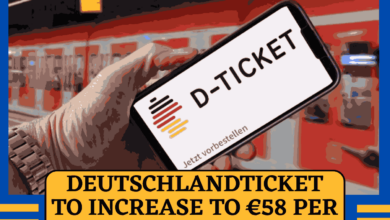Deutsche Bahn vs Flixtrain
Deutsche Bahn vs Flixtrain: Pros And Cons of Germany’s Train Operators
Germany’s rail network is one of the most developed and interconnected in all of Europe, serving millions of travellers every year. Its vast coverage provides an unparalleled opportunity for seamless travel throughout the country and beyond. However, the service quality between DB and Flixtrain, the two market leaders in Germany, can be quite different. Recently, the EU think tank Transport & Environment shed light on some of the key aspects of their operations by comparing them on reliability, affordability of tickets, and convenience in booking. Here is a comprehensive analysis of the strengths and weaknesses of Deutsche Bahn and Flixtrain, including insight to help travelers make the right choice.

1. Reliability
Reliability, especially punctuality, remains an important issue for both operators. For a long time, passengers have been facing delays that can ruin their travel plans and frustration. The statistics speak for themselves:
-
- Deutsche Bahn ranked second-to-last in Europe for reliability, only surpassed by Portugal’s CP and those operators that refused to share delay data.
- DB’s internal data reported the delay of a third of its trains in 2023.
- However, Flixtrain performed even better but still was behind Europe’s train operators in terms of reliability.
It, however, all comes out from years of underinvestment by rail infrastructure. The crumbling tracks, outdated signaling systems, lack of capacity, and others do not allow it to hold on-time services. The German government, recognizing that things must change, decided on a complete overhaul of the rail infrastructure. Included in such plans are improvements to be done on digital signaling, with an increase in the size of tracks, promising Germany’s brighter future in rail travel. All these, however will take years to manifest into a reality; in the meantime, passengers should face and prepare for delays at hand.
2. Price: A clear winner for Flixtrain
In terms of price, Flixtrain is the winner. Being the cheapest railway operator in Europe by price per kilometer, Flixtrain ranked #1 in terms of affordability. It is even ahead of France’s Ouigo. For its part, Deutsche Bahn ranked 19th out of 27 European operators, with prices almost four times higher than those of Flixtrain.
3. Affordability and Its Significance
Affordability is one of the significant concerns for travelers while deciding; nearly half of rail users said that price was an essential factor in deciding the means of transport. Low prices guarantee that Flixtrain will continue to attract price-conscious travelers even if reliability stays a concern.
However, there is a greater concern that hangs over European travel: the price differential between rail and air. Airlines have tax exemptions and fuel subsidies that make long-distance air travel cheaper than train travel. Such a situation undermines the sustainability objectives of rail travel. According to a Europe on Rail survey, 73% of the respondents agreed that tickets for rail travel should generally be cheaper than air travel on the same routes. It is thus a policy reform that needs to be done to allow for sustainable travel options and sustain the long-term viability of rail transport.
4. Booking Convenience
In terms of reliability and affordability, there is stark contrast. In booking convenience, however, both operators are strengths. In the study by Transport & Environment, booking convenience was measured under six sub-criteria:
-
- Booking horizon: How long in advance one can buy tickets?
- Ticket cancellation policies: How easy it is to cancel bookings?
- Ticket change policies: How easy it is to change bookings?
- Availability on third-party platforms: How easy it is to purchase tickets through other channels?
- Language support: For international visitors.
- App store reviews: Ease of use and user-friendliness.
Deutsche Bahn Ticket Types
Deutsche Bahn has different ticket types depending on the needs of passengers:
-
-
-
- Super Sparpreise (Super Saver Price): Non-refundable and non-transferable but very cheap.
- Sparpreise (Saver Price): Refundable or exchangeable for a fee of €10.
- Flexpreise (Flexible Price): Fully flexible but much more expensive.
-
-
DB tickets can be returned within three hours of purchase, giving passengers that little bit of extra flexibility in case they need to correct booking errors. Advance bookings are available up to 12 months ahead for the meticulous planners.
Flixtrain’s Approach
Flixtrain allows booking to six months in advance, hence giving ample time for the planning of the journey. Its ticketing policies may not be as flexible as Deutsche Bahn, but it’s straightforward and cost-effective, and thus smooths the process of booking.
Reliability vs. Cost: Finding the Balance:
For passengers, the decision between Deutsche Bahn and Flixtrain often is a trade-off between reliability and cost. The investments of the German government into infrastructure promise an improvement in reliability for both operators in future and delay sufferers of today.
-
- Budget Travelers: Frixtrain’s low price highly appeals to budget-conscious customers. The low fares make it an excellent value despite the lack of reliability.
- Flexibility seekers: The flexible ticket offers and comprehensive booking policies of DB make it ideal for persons who need flexibility and like comfort, but these costs are a bit higher.
Both Deutsche Bahn and Flixtrain have concerns about reliability, but there is always hope when infrastructure continues to be improved, and in the near future, there will be more dependable travel. Travelers should expect some travel delays especially during peak seasons.
-
- Accessibility: Flixtrain tops in cost: Flixtrain is the cheapest rail company in Europe. Flixtrain allows travelers of all walks of life to travel on its train by offering its service cheaply.
- Ease of Booking: Both of them, Flixtrain and Deutsche Bahn, win in the booking ease, which includes clear mobile applications, support for multiple languages, and flexible policies. While German’s more extended ticket option is available, Flixtrain keeps things simple and affordable. If you value your money then Flixtrain is the way to go since it will offer very cheap tickets and will not have many comforts.
Germany‘s rail network is at a transformational point, with major infrastructure investments promising to make it more reliable and generally more comfortable for passengers. Until these changes are realized, travelers have to make their choices between Deutsche Bahn and Flixtrain judiciously. Both service providers cater to different requirements: budget travel or flexibility and comfort in booking options. The choice depends on what is most important to the individual traveler: price, convenience, or reliability.
Read More at How to Abroad
Germany’s Housing Benefit to increase at the start of 2025
Deutschlandticket to increase to 58 Euros per month Starting in 2025









